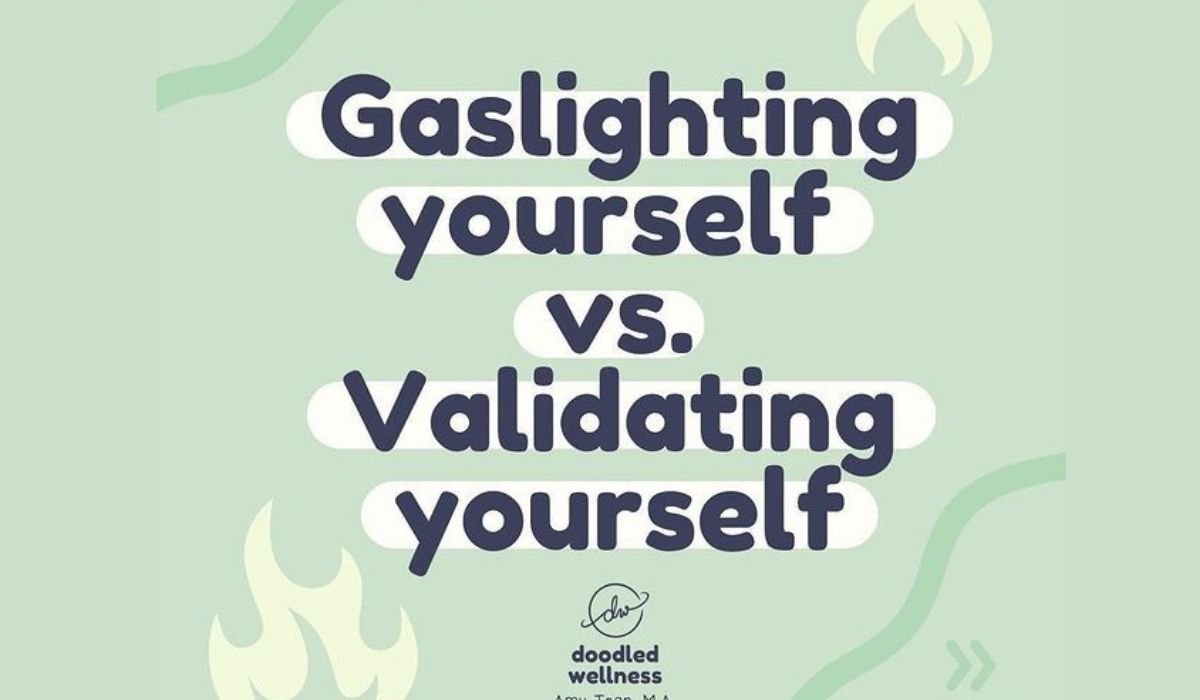Introduction
Have you ever found yourself telling others or even convincing yourself, “I’m fine” when deep down, you know you’re struggling? If so, you’re not alone. Many people, especially in online spaces like Tumblr, talk about “gaslighting myself to not be depressed.” It’s a phrase that resonates because self-gaslighting has become a common way for people to avoid confronting their mental health. But what exactly does this mean, and how does it impact mental well-being?
In this article, we will explore the concept of self-gaslighting, its connection to depression, and the steps you can take to break free from this harmful mindset. Addressing self-gaslighting is crucial for those struggling with depression, as it often prevents individuals from seeking the help they need.
Understanding Gaslighting
Definition of Gaslighting
Gaslighting is a psychological manipulation tactic where someone makes another person question their own reality, feelings, or perceptions. It often occurs in abusive relationships, where one partner controls and distorts the other’s sense of self. This form of emotional abuse leaves the victim doubting their own experiences, making them feel powerless and confused.
Self-Gaslighting: A Form of Self-Deception
While gaslighting is often discussed in the context of relationships, it’s possible to gaslight yourself. Self-gaslighting happens when you downplay or invalidate your own feelings and experiences to avoid acknowledging the seriousness of a problem, like depression. For example, someone who is feeling depressed might tell themselves:
- “It’s not that bad, I’m just overreacting.”
- “Other people have it worse, so I shouldn’t feel this way.”
- “I should just get over it. I’m being too sensitive.”
This type of thinking minimizes the reality of your emotional pain, often to avoid confronting the possibility of depression.
Signs and Symptoms of Self-Gaslighting
Self-gaslighting is not always easy to spot, but there are some common signs to watch for:
- Minimizing Your Emotions: Constantly telling yourself your feelings are not valid or that they don’t matter.
- Dismissing Negative Experiences: Ignoring or making excuses for difficult life events or emotional hardships.
- Comparing Yourself to Others: Using other people’s experiences to invalidate your own struggles, such as thinking, “Others have it worse than me.”
- Avoiding Emotional Conversations: Feeling uncomfortable or avoiding discussions about your mental health with others.
These symptoms can lead you to live in denial about your own mental health and delay seeking support when it’s most needed.
The Impact of Self-Gaslighting on Depression
Worsening Symptoms
When you gaslight yourself into believing that your depression is not “real” or “serious,” it only exacerbates the symptoms. Depression thrives in silence and self-denial, growing worse when ignored. Over time, self-gaslighting leads to an overwhelming sense of hopelessness because you’re not addressing the root of your feelings.
- Increased Fatigue: Depression often manifests as physical exhaustion, and when you tell yourself it’s just laziness or a lack of willpower, you may not seek proper treatment.
- Heightened Anxiety: Continuously suppressing your emotions can lead to an increase in anxiety, making it even more difficult to manage day-to-day life.
Delayed Treatment
Self-gaslighting can cause significant delays in seeking help. If you’re constantly telling yourself that your depression isn’t serious or doesn’t require attention, you may put off talking to a therapist or doctor. This can result in more severe mental health issues later on, as untreated depression often worsens over time.
Emotional Toll
The emotional burden of denying your feelings can be immense. Living in a state of self-gaslighting takes a heavy toll, leading to:
- Emotional numbness: A feeling of disconnect from your own emotions.
- Self-blame: Feeling responsible for not being able to “snap out of it” when in reality, depression is a complex mental health issue that requires care.
Breaking Free from Self-Gaslighting
Recognizing Patterns of Self-Gaslighting
The first step in breaking free from self-gaslighting is to recognize when it’s happening. Pay attention to your inner dialogue and notice if you’re:
- Downplaying your emotions.
- Comparing your struggles to others to invalidate your feelings.
- Ignoring warning signs like persistent sadness, lack of motivation, or irritability.
By becoming aware of these patterns, you can begin to challenge and change them.
Challenging Negative Thoughts
Once you recognize self-gaslighting, the next step is to challenge those negative thoughts. Reframing your inner dialogue to be more compassionate is key. For example, instead of thinking, “I shouldn’t be this upset,” try saying, “It’s okay to feel this way. My emotions are valid.”
Here are a few strategies to help challenge negative thoughts:
- Keep a Journal: Writing down your feelings can help you see patterns and give you a clearer understanding of your emotional state.
- Talk to a Trusted Friend: Sometimes, hearing an outside perspective can help validate your feelings and remind you that your experiences are real.
Seeking Support
Breaking free from self-gaslighting often requires external support. Whether it’s talking to friends or family, or seeking professional help from a therapist, having someone who listens and validates your experiences is crucial. Therapy, in particular, can help you recognize and address the harmful thought patterns that contribute to self-gaslighting.
Self-Compassion and Validation
Importance of Self-Compassion
One of the most effective ways to overcome self-gaslighting is to practice self-compassion. Treat yourself with the same kindness and understanding you would offer a friend who is going through a difficult time. Self-compassion involves recognizing that it’s okay to struggle, and that your pain is valid, no matter how small or insignificant it might seem.
Validating Your Emotions
It’s essential to validate your own emotions. This means accepting your feelings without judgment, even if they are painful or uncomfortable. Remind yourself that it’s okay to feel sad, frustrated, or overwhelmed. Your emotions are a natural response to life’s challenges, and they don’t make you weak or flawed.
Self-Care Strategies
Engaging in regular self-care practices can also help combat self-gaslighting. Here are some self-care tips:
- Physical Activity: Exercise has been shown to improve mood and reduce symptoms of depression.
- Mindfulness Meditation: Practicing mindfulness can help you stay present and connect with your emotions in a non-judgmental way.
- Creative Outlets: Engaging in creative activities like writing, drawing, or music can provide an emotional release and a way to process feelings.
Overcoming Depression
Seeking Professional Help
If you’re struggling with depression and self-gaslighting, professional help can make a world of difference. Therapists and counselors are trained to help you work through your emotions and develop healthy coping mechanisms. Therapy, such as cognitive-behavioral therapy (CBT), can help challenge the negative thought patterns that fuel self-gaslighting.
Treatment Options
There are several treatment options for depression, including:
- Medication: Antidepressants can be helpful for some people, especially when combined with therapy.
- Therapy: Cognitive-behavioral therapy, talk therapy, or other therapeutic approaches can help you address the root causes of depression.
Coping Mechanisms
In addition to professional treatment, developing personal coping mechanisms can help manage depression. These might include:
- Routine Building: Establishing a daily routine can create a sense of normalcy and accomplishment, even on difficult days.
- Connecting with Others: Isolation can make depression worse. Reaching out to friends, family, or support groups can provide comfort.
YOU MAY ALSO LIKE: Discover Andrea Carbonaro Michigan and Her Inspiring Journey
Conclusion
Gaslighting yourself to not be depressed is a harmful coping mechanism that often makes things worse. Recognizing self-gaslighting patterns, seeking support, and practicing self-compassion are essential steps in breaking free from this mindset. Remember, your feelings are valid, and seeking help is a sign of strength, not weakness. Depression is a serious condition, but with the right tools and support, you can overcome it. Don’t be afraid to reach out for help—you don’t have to face this alone.
FAQs
1. What does “gaslighting myself to not be depressed” mean?
“Gaslighting myself to not be depressed” refers to convincing yourself that your feelings of depression are invalid or not real, downplaying your emotional struggles to avoid confronting them.
2. How can self-gaslighting affect my mental health?
Self-gaslighting can worsen depression by delaying treatment, increasing feelings of shame, and causing emotional exhaustion, ultimately making the condition harder to manage.
3. What are common signs of self-gaslighting?
Common signs include minimizing your feelings, comparing your struggles to others, and convincing yourself that you’re overreacting or “being too sensitive.”
4. How can I stop gaslighting myself when feeling depressed?
To stop self-gaslighting, start recognizing negative thought patterns, practice self-compassion, challenge those thoughts, and seek support from friends, family, or a therapist.
5. Why is self-compassion important in overcoming self-gaslighting?
Self-compassion helps you validate your feelings and accept your emotional experiences, making it easier to address your depression and seek the help you need.











